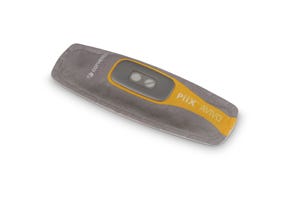Medtronic is rumored to be buying wearable sensor firm Corventis. The company can track heart failure patients remotely to see if they have fluid build up in their bodies.
May 27, 2014

Last week MobiHealthNews reported that Medtronic has bought a wearable, noninvasive mobile cardiac telemetry company for $150 million.
Medtronic will not comment on the rumored acquisition of Corventis, and it appears that the final price may be lower than $150 million. A Corventis representative did not respond to an email query.
The low price-tag would seem to imply that it is a minor acquisition, and from a Wall Street perspective it probably is.
However, if the acquisition pans out, it underscores two profound changes afoot in the medtech industry: First, wearables, at least those with clinical applications, have real value in the healthcare world beyond wellness. Covidien just became a trendsetter in the space by being the first traditional medtech player to buy a wearables company - Zephyr Technologies - earlier this month to bolster its remote patient monitoring business.
And second, large medtech companies are moving to own the disease.
The latter trend is especially important given the direction of healthcare reimbursement.
Medtech experts have been saying all along that to be relevant in the future, companies will need to play across the healthcare continuum - in the diagnosis, hospital, home and disease management spaces to name a few. In order to do that, Medtronic and other firms must own the disease and come up with services and products that address those needs at every stage and space of the patient's healthcare experience.
Heart failure is an expensive disease to treat and manage, and Medtronic in the past has focused on one piece of the pie: selling implantable devices to hospitals to manage a heart failure event. Now hospitals are moving to scrutinize costs pressuring medtechs to provide products at cheaper and cheaper prices. At the same time they are struggling to find ways to keep readmissions of heart failure patients low to avoid a Medicare penalty. These new business realities demand a shakeup of the old medtech business model.
Learn about the past, present and future of device-based therapies to treat heart failure from co-founder of Coridea at the MD&M East Conference & Expo, June 11 in New York City |
Senior management at Medtronic appear to be implementing a strategy communicating by CEO Omar Ishrak when he publicly revealed his aim to transform the medical device maker to the world's premier medtech solutions partner to hospitals.
First came the Cardiocom deal in 2013, where Medtronic made a small, $200 million payment to buy a telehealth, disease management company that can monitor weight gain of heart failure patients remotely, in addition to providing other solutions such as nurse call centers, to manage heart failure patients and those with other diseases remotely.
And now comes reports of the acquisition of Corventis, which like Cardiocom is coincidentally is also based in Minnesota, where Medtronic has its headquarters.
So what capabilities does St. Paul-based Corventis offer the Minnesota medical device behemoth?
It has developed two wearable sensors, one of which can detect nonlethal arrhythmia including atrial fibrillation - the Piix Nuvant. This allows patients to immediately record an ECG when they feel symptoms of arrhythmia occur. The data - collected ECGS and heart rate among other things - is transmitted to a Corventis Monitoring Center - where the data is reviewed by certified cardiographic technicians who can alert the physician when needed.
|
The Avivo Piix Wearable Sensor |
Meanwhile the other sensor - Piix Avivo - can monitor fluid status of heart failure patients. Retaining fluids is an early indicator of the worsening status of such patients and unless timely action is taken by physicians can result in a hospital admission. Piix Avivo can collect this information, along with ECG, heart rate, posture and other clinical datapoints through the wearable sensor and transmit that data wirelessly to a Corventis Monitoring Center where the data is similarly reviewed and acted upon when necessary.
So, with this purchase Medtronic is moving to broaden the type of heart failure patient that it can serve - not just those who need a pacemaker or a defibrillator, but also those who have irregular heart beat. At the same time, with the Avivo Mobile Patient Management System it can better serve patients who are at risk of fluid retention. Both Avivo and Nuvant have the blessing of the FDA.
Payors are interested in solutions that can manage patients of chronic disease such as heart failure because it helps to keep claims low at a time when a large swath of the U.S. population are becoming insured. Medtronic already has a collaboration with Aetna in the realm of heart disease and diabetes.
Now with the rumored acquisition of Corventis, Medtronic has another tool in its arsenal to manage heart failure patients.
[Photo Credit: iStockphoto.com user Cimmerian]
-- By Arundhati Parmar, Senior Editor, MD+DI
[email protected]
You May Also Like



